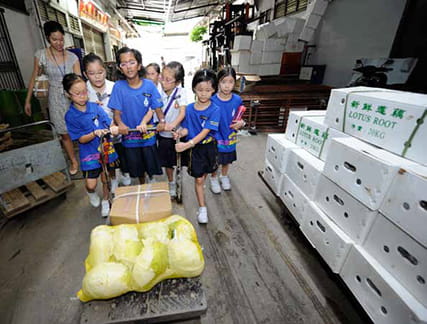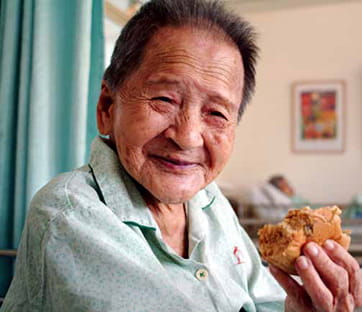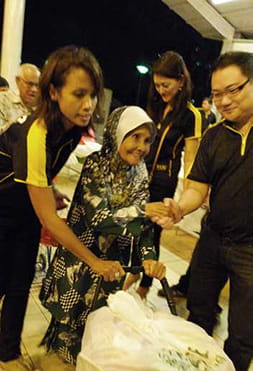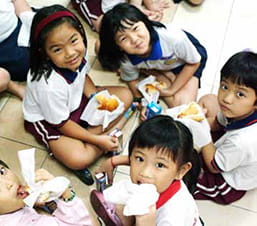Stories > Enough for All
Enough for All
A growing network of helping hands is leading the charge to put food on the tables where it is most needed.
By Stella Danker

Girls Brigade Singapore solicited produce from Pasir Panjang Wholesale Market to prepare food for 5,000 people, together with Willing Hearts. Photo Credit SPH-ST
IT is a sign of active citizenry when individuals take it upon themselves to do something about social challenges they witness everyday. This is happening in real and multiple ways in Singapore but in this story, the focus is on food distribution. While religious and ethnic group organisations have long been feeding those who come to their doors, there is a web of food for good spreading across the island. Sometimes it is one individual helping another, sometimes it is a group of friends who organise monthly deliveries of food essentials to people in need. Some of the major players that stand out for the scale of their efforts to take the edge off hunger are Willing Hearts, Food From the Heart, the Metropolitan YMCA and Transient Workers Count Too (TWC2).
Well Fare
Former small business owner Tony Tay, 66, has been poor and hungry before. He left school at 12 because his single mother could not afford to keep him there.
Tay is the force behind Singapore’s largest soup kitchen, Willing Hearts. It started in 2003 with 10 parishioners from the Church of St. Michael, including Tay and his wife Mary, as a bread distribution service. It has no religious affiliations and serves anyone who needs food.
“Then somebody gave us some vegetables,” says Tay, and the group started providing cooked meals. “We started cooking a few meals a day.
The next thing I knew, we were feeding 500 people. Now we are feeding 2,500 to 3,000 people every day.”
The work begins every morning at 5.30am. Tay and a group of volunteers sweat over three sizzling commercial woks to get meals cooked, packed and sent to more than 30 centres by 9am.

Willing Hearts volunteers packing cooked meals — 60% of these volunteers are working professionals. Photo Credit: SPH-ST
Volunteers stream into the fourth floor of Cideco industrial complex on Genting Lane to pitch in, including students from Serangoon Secondary School. At its peak of activity, about 40 people are there, doing whatever is needed — cutting vegetables, manning the wok, and packing the food into Muslim, vegetarian or seafood-free packages for gout sufferers.
The number of volunteers, donors and recipients grows by word-of-mouth, as stories and information are swopped.
For example, a concerned volunteer tells Tay of a frail 82-year-old woman in Cantonment Road who is has not eaten in two days. Another volunteer, retired civil servant John Lau, 72, comes two to four times a week to deliver food to the centres, says, “Taxi drivers help deliver the food. There’s a woman who drives here in her Jaguar but she humbly sweeps floors and does whatever is needed. We are all equal in this place.”
Willing Hearts is a completely volunteer-run effort, dependent on support. Temples have donated its five vans and provide the rice. Bread is given by bakeries. Other food comes from wholesale centres. Tay raises the $7,500 monthly rent, another $4,000 to cover utilities and gas, and some $20,000 to buy chicken and fish.
What began as a way to kill two birds with one stone – to provide bread to the needy while ensuring unsold fresh bread is not wasted – has evolved into a full fledged food distribution service.
Food from the Heart (FFTH) is a charity that was founded by Austrian couple Christine and Henry Laimer in 2003 with 130 volunteers and 23 bakeries. The couple has since returned to Austria but the charity has grown on its own steam. Today 1,700 volunteers distribute unsold bread collected at the end of each day from 100 top bakeries and hotels. In a given month, approximately 28,000kg of bread eases the hunger of some 14,500 low-income earners.
From this evolved a monthly $30 provisions handout of canned food, rice, cooking oil, noodles, beverages, toiletries and household items donated by companies or collected at food drives. These supplies are distributed to 4,500 needy people through 27 self-collection centres. FFTH raises the $700,000 a year it needs to run the operation.
Many of its beneficiaries are minors who are unable to attend school regularly because of abusive or delinquent parents, ill parents struggling with medical expenses, or who have been abandoned with impoverished grandparents. It has under its wing some 875 kids from 20 schools, and plans to add at least students from four more schools a year.
The children are given $55 food goodie bags on two conditions — good attendance and good behaviour. “We do not link it to academic results because we believe that will come once we have good attendance and good behaviour,” says Quek. To reinforce this, FFTH started the “I Can” award. It is presented on stage, with much ceremony, to a child whose teachers say has shown the most improvement in behaviour, attendance and sports involvement. With the recognition comes a $100 book voucher, a trophy and a certificate of achievement.
Come end of the school year, FFTH holds a toy buffet for some 1,500 kids with new toys donated by corporations. Needy as these kids are, they know compassion and learn how to give.
Quek narrates the tale of a boy who chose a Barbie doll. “The boy said he played games and had food to eat, but his sister back home had nothing. So he picked a toy for her.
Another girl at the party ate half a muffin and kept the other half in her bag. When asked why she did this, she said she was taking it home for her sister. ”
“There will always be people who fall through the cracks. We try to lighten their burden,” says Quek.
Bags of Goodwill
A British expatriate and his girlfriend got a reality check when they discovered that what they spend on beer in a single night could help provide groceries to several families as part of the Metropolitan YMCA’s food programme.
 The couple had strolled past the MYMCA’s Genting Lane warehouse where volunteers were assembling food packages worth $40 to $70, depending on family size. They had not realised that there are people here who may be unable to buy food.
The couple had strolled past the MYMCA’s Genting Lane warehouse where volunteers were assembling food packages worth $40 to $70, depending on family size. They had not realised that there are people here who may be unable to buy food.
They immediately donated $400 and committed to giving $200 each month. This programme, called MY Manna, was launched in 1997 to provide a monthly grocery bag to some 20 families. Now, about 150 four-and five-member families are receiving these bags with essentials like rice, cooking oil, instant noodles, canned food and basic toiletries. MYMCA, through its Community Services programmes, allocates $5,000 a month for it with the funds coming from donations. One man has been giving tubes of toothpaste every month.
Francis Foo, Manager of the YMCA’s Community Services Department, says the programme is intended “to improve and change people’s lives, especially the disadvantaged and marginalised.” Outings were organised previously, but those were one-off events, whereas MY Manna puts food on the table and is “more meaningful.”
 To identify the genuinely needy, the MYMCA works with the Ministry of Social and Family Development and several community service channels. Provisions are given to people who are eligible for public assistance either because of low income or temporary financial hardship arising from various circumstances.
To identify the genuinely needy, the MYMCA works with the Ministry of Social and Family Development and several community service channels. Provisions are given to people who are eligible for public assistance either because of low income or temporary financial hardship arising from various circumstances.
Some 70 YMCA and other volunteers run its three centres at Woodlands, East Coast and Geylang. Another centre in Ang Mo Kio opened recently, providing aid to another 50 to 60 families, and the plan is to add one new centre every year.
Since 2005, the YMCA has also done its Chicken Run for the four main festive seasons of Chinese New Year, Deepavali, Hari Raya and Christmas. In this effort, donors fund festive food packages that provide the poor with chicken, fruit and cakes.

Dr. Russel Heng runs Transient Workers Count too which has provided over 362,000 meals to foreign workers since 2008.
Meals for Migrants
This initiative began with a compassionate restaurant owner who gave free food to migrant workers laid off during the 2008 global recession.
Mainly from South Asia, these workers had taken to sleeping on the side lanes of Serangoon Road, where they were noticed by the restaurant owner.
Enter Transient Workers Count Too (TWC2) which began with the aim of helping Singaporeans treat their domestic help fairly, teamed up with One (Singapore), the local entity of an international effort to eradicate poverty.
TWC2 initiated a regular free-meal programme for destitute workers at a restaurant on Cuff Road in Little India. Called The Cuff Road Project (TCRP), it started by feeding around 100 men per meal. Today, TCRP serves meals to an average of 200 to 350 male workers a day.
“Singapore’s system makes it hard for foreign workers to seek redress,” explains Dr Russell Heng, President of TWC2. Those unfortunate enough to find themselves owed back pay or scammed by rogue employers or agents lodge a report with the Ministry of Manpower. The men are left to fend for themselves. They have a special pass that allows them to remain in Singapore but are often destitute and not allowed to work. Female domestic workers are referred to shelters where they are provided for.
With no income, daily sustenance poses a problem. This is where TWC2 steps in. Since its launch in March 2008, TCRP has served over 362,167 meals. The Lee Foundation has been a major supporter of this project and donated $200,000 last year.
WANT TO HELP?
Willing Hearts: T: 64761098,
willinghearts.org.sg
Food from the Heart: T: 62597176,
foodheart.org
Metropolitain YMCA: T: 67459149,
mymca.org.sg
Transient Workers Count Too:
T: 62477001, twc2.org.sg


